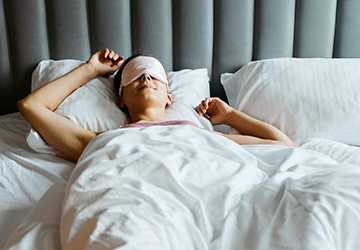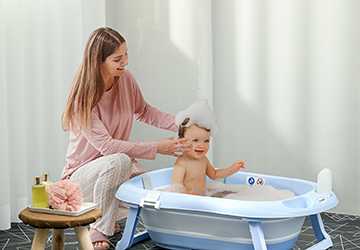How to Achieve a Good Night’s Sleep
A good night's sleep is vital to our physical and mental health. Practicing good sleep hygiene and getting enough sleep is difficult for many people for various reasons. Sleeping 7-9 hours each night can be challenging when you have insomnia, and improving sleep hygiene is essential to healthy sleep.
Poor sleep hygiene, including habits and practices that interfere with sleep, can thoughtfully contribute to sleep problems and other central and minor health problems. In this blog, we discuss some helpful tips and tricks to improve your sleep hygiene so you can enjoy a good night's sleep.
Create a consistent sleep schedule
Maintaining a regular sleep schedule is an essential part of good sleep hygiene, and it can help regulate our body's natural sleep-wake cycle, making it easier to fall asleep and stay in deep sleep. Establishing a consistent sleep schedule is critical to improving sleep hygiene.
Setting and sticking to a consistent bedtime and wake-up time, including weekends and holidays, is essential. You can improve your sleep quality and overall health by training your body to recognize the correct times to sleep and wake up. Remember that it may take time for your body to adjust to a new sleep pattern.
Create a relaxing sleeping environment
One of the best tips for improving sleep hygiene is creating a calming environment to encourage healthy sleep habits. The bedroom should be suitable for optimal sleep quality, dark and quiet, not too cold or hot. Consider using blackout curtains or eye masks to ensure a good night's sleep to avoid light disturbances. Earplugs or white noise devices can be used to reduce noise pollution. Mattresses and pillows should be as comfortable and supportive as you like.
Limit screen time before bed
Blue light emitted by electronic devices such as smartphones, tablets, and computers can disrupt our body's natural sleep-wake cycle. If you're trying to improve your sleep hygiene, you must reduce the screen time you spend before bed. It is recommended to stop using screens at least two hours before bed to allow your body to relax and prepare for a good night's sleep.
Participate in relaxation activities such as reading a book, taking a warm bath, or doing deep breathing exercises to promote relaxation and calm.
Practice relaxation techniques
One of the best techniques for improving sleep is relaxation techniques. These are all effective ways to reduce stress and promote relaxation, which can lead to better sleep hygiene. Deep breathing, meditation, and progressive muscle relaxation are popular relaxation techniques that can be incorporated into your bedtime routine.
Deep breathing exercises will help you calm down and regulate your breathing, making it easier to fall asleep. Meditation helps relieve stress and anxiety by focusing on the present moment. Progressive muscle relaxation involves tensing and relaxing every muscle group in the body, releasing any tension built up during the day. These techniques can be practiced alone or in combination to create a relaxing sleep routine.
Avoid doping
To improve your sleep hygiene, you must be aware of your consumption of stimulants. Caffeine, nicotine, and alcohol are all known to be bad for restful sleep, so limiting your intake is best to ensure a good night's sleep.
Avoiding these substances, especially at bedtime, is recommended as they can interfere with falling and staying asleep. Consider a soothing herbal tea or a cup of warm milk instead.

Exercise regularly
Incorporating regular physical activity into your routine can positively impact your overall health and sleep quality. Research shows that people who exercise regularly are likelier to experience better sleep quality and increased daytime alertness. Proper timing of exercise is essential to maximize benefits.
However, you must avoid exercising right before bed, as this can stimulate your body and make it difficult to fall asleep. Experts recommend getting your workout done at least three hours before bed and planning to do it in the morning or early afternoon. By allowing your body to wind down before bed, you can better reap the energizing benefits of exercise.
Avoid heavy meals before bed
A heavy meal before bed can lead to discomfort and digestive issues and ultimately affect sleep quality. Eating important meals at least 2-3 hours before bed is recommended to allow time for digestion.
A little-known tip for better sleep hygiene is having a snack before bed because going hungry can also disrupt sleep. When choosing foods, choose foods that are easy to digest. For example, you could have a small serving of granola with milk or a slice of toast with peanut butter.
Use sleeping pills wisely
While sleeping pills can help promote sleep, they must be used cautiously. Some sleeping pills can become habitual, and prolonged use can affect sleep quality. If you're considering using a sleep aid, consult your doctor and follow their advice. They can recommend the right sleep aid to help you sleep better without compromising your health. Sleeping pills should only be used as a short-term solution, not a long-term solution to sleep problems.
Diploma
A good night's sleep is vital to maintaining our overall health and well-being and energizing the next day. Sleep hygiene can improve sleep quality and leave you feeling refreshed and energized when you wake up.
Follow the tips for better sleep on this blog. These are all critical factors to consider for a good night's sleep. Sleep hygiene is essential to improving your quality of life and overall health.



















